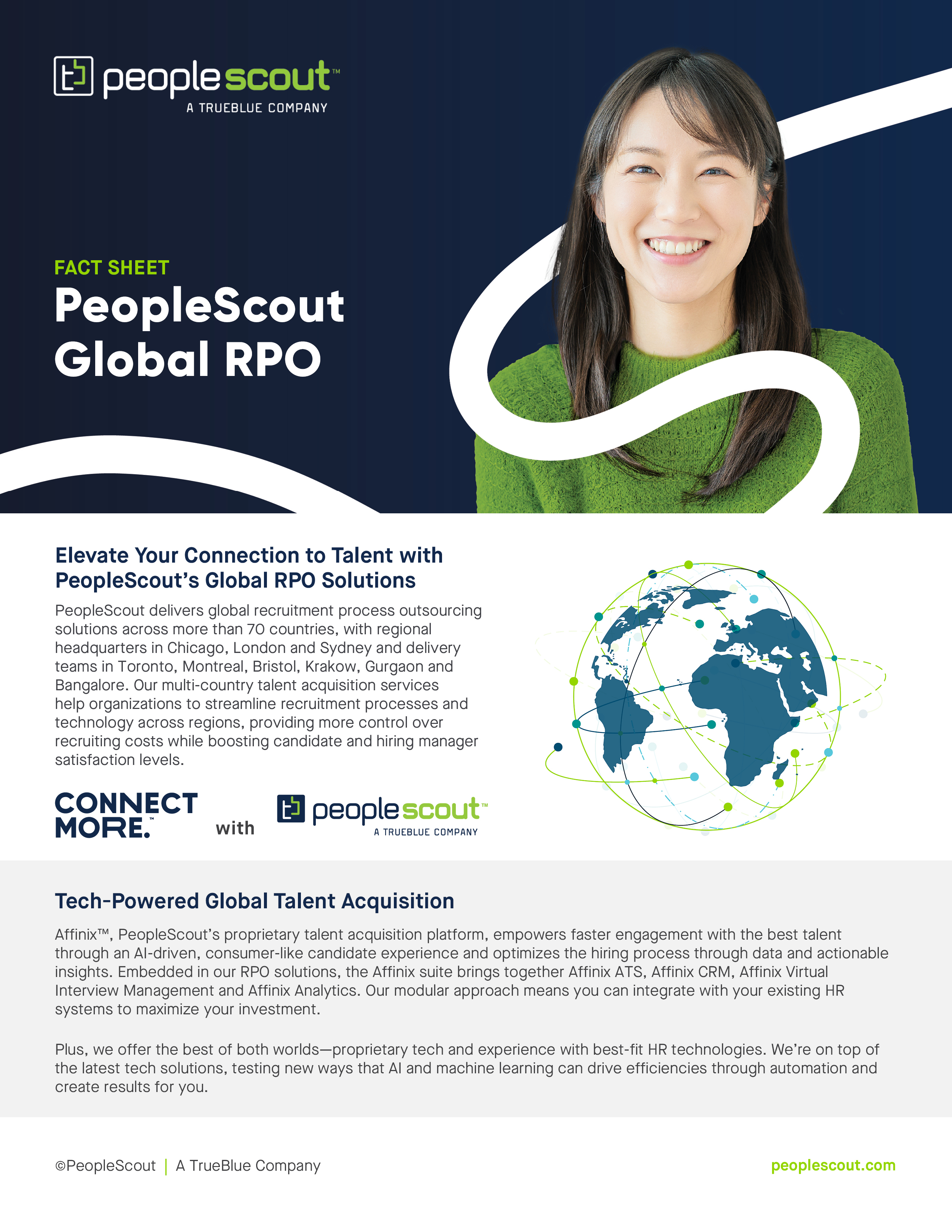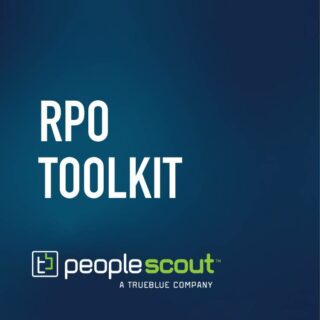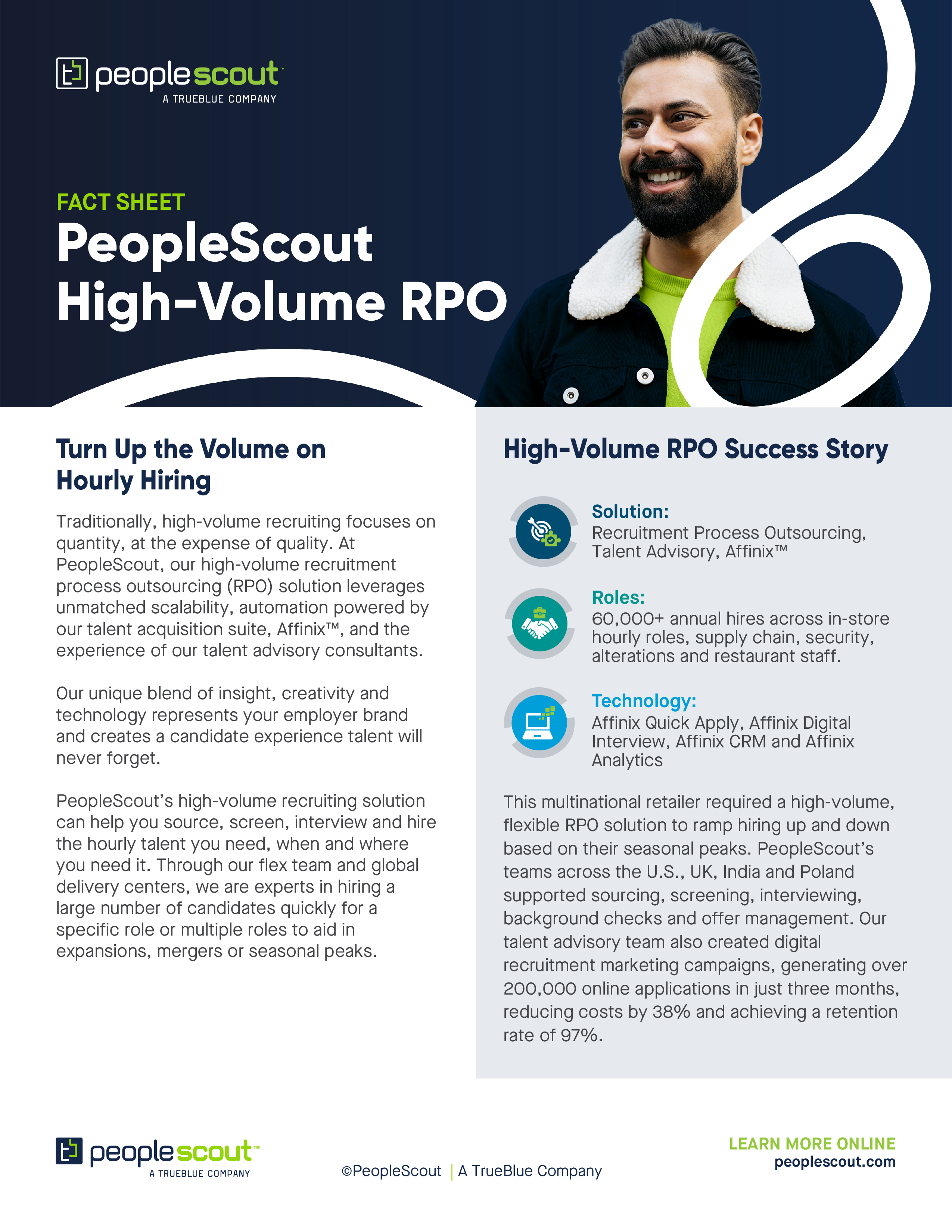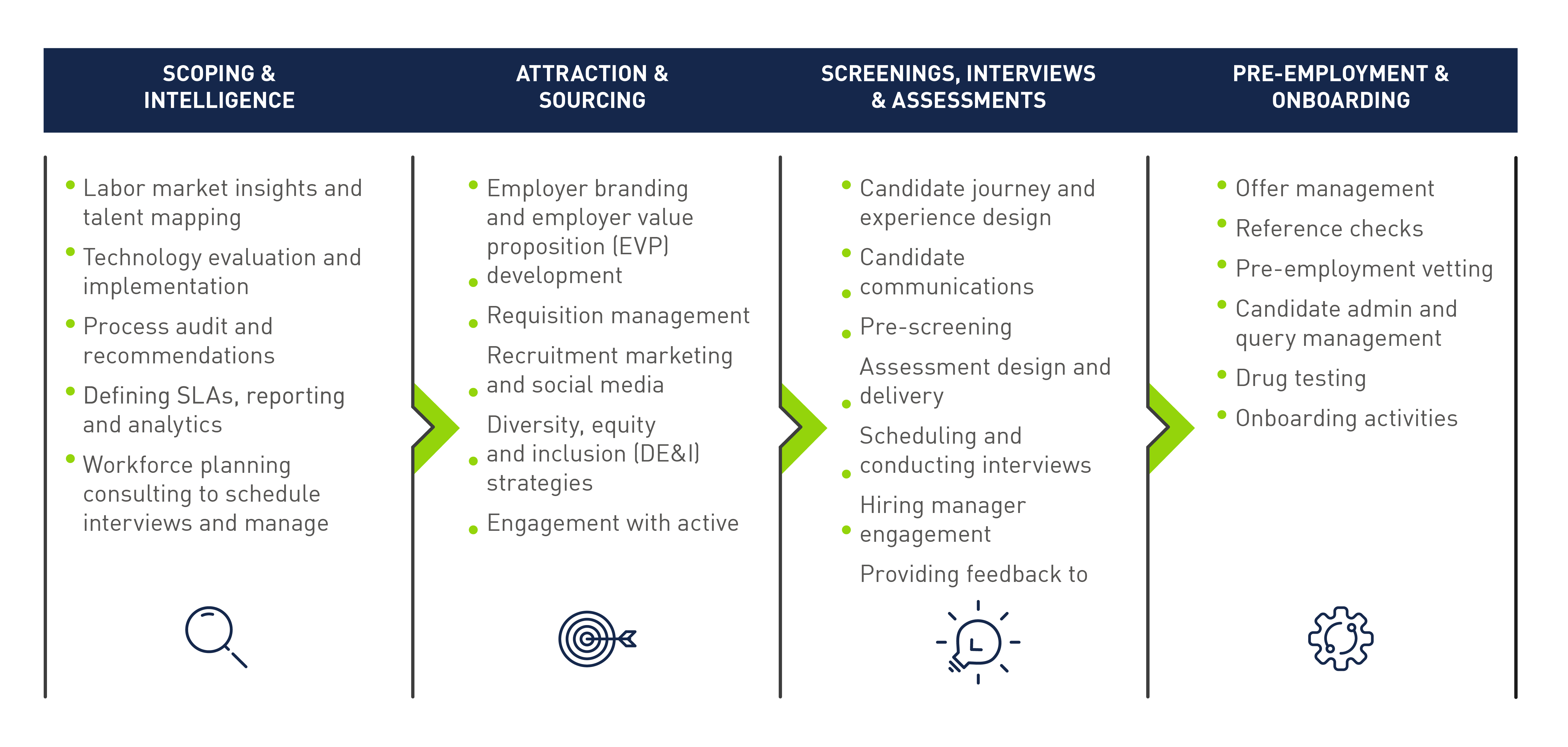So, what is recruitment process outsourcing (RPO), and why should companies use it? RPO can boost your talent acquisition by optimizing processes amid fierce competition. Whether you’re exploring RPO or want to learn more about maximizing it, this guide will provide valuable insights. Understand how partnering with an RPO can boost your talent acquisition outcomes.
This overview explains RPO, answering common questions, including:
- How RPO works
- Types of RPO
- The benefits of outsourcing recruitment
- What to look for when selecting an RPO partner
👉 Get our RPO buyer’s guide.
What is Recruitment Process Outsourcing?
Recruitment process outsourcing (RPO) is a type of business process outsourcing (BPO) in which an external organization (RPO provider) supports an employer’s talent acquisition function by assuming responsibility for some or all facets of the talent acquisition function to support some or all of an employer’s hiring needs.
For example, an RPO engagement may only cover sourcing and screening candidates (partial-cycle RPO) or it may cover the entire recruitment lifecycle from receiving hiring manager’s requisitions all the way to presenting and negotiating job offers to candidates (full-cycle RPO). An RPO provider works closely with an organization’s internal talent acquisition team, either remotely or on-site.
Why Do Companies Choose to Outsource Recruitment?
Below, we highlight a few high-level reasons why organizations seek RPO providers, and conversely, when RPO may not be a good fit:
REASONS TO ENGAGE AN RPO PROVIDER:
- If your organization is looking for more speed, agility and flexibility in your recruiting processes
- If you are looking to improve the quality of candidates applying to your positions or struggle to attract the right talent
- If your organization is looking for a more cost-effective and standardized recruiting process
- If your organization’s current use of recruitment technology isn’t up to par and you are seeking a variety of digital upgrades specific to your organization’s recruiting objectives
- If your organization is looking to increase diversity hiring, RPO providers can help you uncover new diverse talent recruitment sources and strategies
REASONS NOT TO ENGAGE AN RPO PROVIDER:
- If your company culture is not ready for outsourcing talent recruitment
- If you just need a vendor to fill a quick requisition or two as opposed to a partner to support your talent acquisition strategy
- If your organization isn’t open to optimizing your recruiting processes and tech stack
Remember, these reasons are not set in stone. Only you and your organization can assess if you are in need of an RPO partner’s services. An RPO partner should customize their solution to match your needs and offer flexible options to support for peak hiring, hard-to-fill positions, compressed time frames and more—however it works best for you.
👉 Are you Ready for RPO? Ask Yourself These Three Questions.
How Does RPO Work?
During an RPO engagement, the RPO provider’s team works closely with their client’s talent acquisition team and hiring managers to learn the organization’s long-term talent acquisition strategy, hiring challenges and goals.
The RPO provider then designs a customized recruiting program tailored to support the client’s specific needs. RPO is not a one-size-fits-all solution. A leading RPO partner will customize its service to match your requirements, which could include any or all of the following talent acquisition activities:
👉 Learn more about what to expect in an RPO partnership.
What is the Difference Between an RPO Provider and a Staffing Agency?
An RPO provider is distinct from a staffing agency or headhunter. Staffing agencies identify candidates, obtain their résumés or CVs and submit them to the client.
An RPO partnership brings a higher level of engagement. Your RPO provider will do a deep dive into your talent acquisition goals and challenges and then create and execute a customized recruitment program—and report back on the results. An RPO partner is a trusted advisor who can help you gain agility and future-proof your business.
👉 Learn the top differences between an RPO and a staffing agency.
What are the Types of RPO Models?
Designed for flexibility, RPO can be customized to meet your needs. Fully outsourcing recruitment may not make sense for all organizations. But that doesn’t mean RPO won’t provide value if you’re not ready to go all in. RPO teams are often used alongside existing in-house recruitment teams. The RPO can complement your current recruitment program by handling recruiting for specific job groups, locations or business units.
Here are various types of RPO that are commonly available:
Full-Cycle RPO
The RPO partner owns the entire recruitment cycle from opening requisitions all the way to presenting and negotiating the job offer—and all activities in between. This solution offers the client the full benefit of the RPO partner’s expertise which most organizations don’t have in-house, including value-added services like market insights, recruitment technology and employer brand consulting.
Partial Cycle RPO
The RPO partner covers certain parts of the recruitment process to boost internal recruitment resources. For example, the RPO partner might source and screen candidates and then hand them over to the in-house recruitment team to schedule interviews and manage offers.
Recruiter On-Demand
Recruiter On-Demand engagements are typically fixed-term contracts meant to address specific recruitment challenges such as seasonal hiring peaks, hard-to-fill positions, compressed timeframes and more. The RPO is there to augment the in-house team, often due to rapid growth. These engagements kick off quickly, and the required positions are filled within a few months.
👉 Learn more about recruiter on-demand.
Modular RPO
Modular RPO, or variable RPO, is a strategic approach to managing the recruitment process in an ultra-focused manner. It involves outsourcing specific components of the recruitment process to an RPO provider, or as a supplement to an existing outsourced recruitment engagement, providing quick access to targeted and customized recruitment support. With a modular or à la carte approach, you choose from a range of services based on your requirements.
👉 Learn more about modular RPO.
High-Volume RPO
High-volume RPO involves sourcing, screening, interviewing and hiring large numbers of applicants for similar openings or job types. It requires a tricky balance of keeping substantial quantities of job applicants moving through the recruitment process at speed. Plus, throughout the year it requires talent acquisition teams to scale up quickly to meet seasonal demand, like for holiday shopping periods or during peak travel times.
👉 Learn how to overcome high-volume hiring challenges.
What are the Benefits of RPO?
Now that you can answer the question, “What is recruitment process outsourcing?”, you may be wondering why organizations engage an RPO provider. Partnering with an experienced RPO gives you access to extensive recruitment knowledge across industries, roles and regions. RPOs have managed every type of hiring campaign imaginable. Whether you need help with one function or end-to-end recruiting, RPO offers advantages including:
Minimize Costs
Every day a role goes unfilled, your organization loses productivity, which can lead to losses in revenue and profits. Plus, inefficiencies in your organization’s hiring processes can result in lost revenue and more hours spent recruiting. And, if your organization hires the wrong person, you’ll spend even more time and money recruiting and training a replacement for the bad hire. By streamlining and optimizing recruitment processes, improving the time-to-hire and retention rates, RPO providers can increase your recruiting return on investment and deliver real cost savings to your bottom line. In fact, Everest Group states that organizations can expect a 45% to 55% annual savings with RPO compared to in-house recruitment.
Access Higher Quality Talent Faster
As skills shortages and talent scarcity becomes more challenging, having an RPO team digging into passive sourcing to access niche skills sets will boost time to hire and improve quality-of-hire. RPO providers leverage their comprehensive talent networks and effective screening and assessment tools to produce stronger candidates and more diverse talent pools. This keeps hiring managers happy and helps your organization achieve its goals.
A leading RPO provider should flex to meet your requirements. Your organization can scale the amount of work your RPO provider performs to better manage your recruitment cost-per-hire goals and recruiting budget. When you have an increased demand for talent, an RPO provider can promptly scale up your team of dedicated recruiters to keep on top of your increased demands. This works the other way around as well: when there is less demand, we can scale down, saving you recruitment spend, and you avoid layoffs in your talent acquisition team during low demand periods.
Enhanced Candidate Experience
You want your recruitment process to leave every applicant, regardless of whether they get the job, with a positive experience. Your RPO partner can advise on ways to improve the candidate experience including career site audits, job application recommendations and how to leverage technology to speed up the process and reduce friction.
👉 Get Inside the Candidate Experience with our exclusive research report.
Best-Fit Technology
RPO providers can help you implement technology solutions that balance human expertise with automation. RPO partners have expertise with platforms across the HR and talent acquisition tech ecosystem and can make recommendations to help you attract and engage talent more effectively. PeopleScout’s total talent suite, Affinix® proprietary total talent suite of AI-powered tools, connecting applicant tracking, candidate relationship management, recruitment marketing, digital interviewing and talent analytics.
Access More Expertise
Partnering with an RPO means you gain important talent acquisition expertise without having to invest in internal resources. RPO partners have developed a depth and breadth of experience from working across many clients, industries, job types and regions. While they offer recruitment sourcing best practices, they also offer value-added services that will optimize and streamline each phase of the recruiting process like employer branding, recruitment marketing, skills assessment, market insights, specialist sourcing solutions and more.
Improve Diversity
Through experience collected over many client engagements, RPO teams are knowledgeable about different talent attraction options and can help you expand to new job boards, social media groups, online forums and events to engage a more diverse workforce. Plus, RPOs understand the regional nuances of DE&I issues. For example, in some countries like Poland, it is not legal to ask candidates their ethnicity, gender, etc.
Workforce Planning Strategy
Leading RPO providers can provide labor market insights, talent intelligence and benchmarking data. With access to these insights, you have the data you need to support your workforce strategy as well as tactical business decisions. You can capitalize on the latest market analysis, thought leadership and competitive intelligence to inform your talent strategy. Your RPO partner can provide analytics to help you understand what’s working so you can maximize your ROI.
Global Reach
Leading organizations are taking a much more holistic view of the talent landscape and are looking for ways to standardize across regions. Working with a single partner for multi-country RPO eliminates the need for multiple relationships and saves time and money—while raising the quality of your hires. An RPO provider can be your most valuable partner in global expansion, because they bring a wealth of knowledge and experience gained through working with clients in different industries around the world.
Seamless Compliance
A significant aspect of recruiting is dealing with the multitude of compliance requirements that vary by jurisdiction. Your partner should help you navigate the labor laws and compliance issues that accompany any sourcing program. An RPO provider’s rigorous processes ensure a legally compliant hiring process and streamlined responses to audits. Additionally, a partner can help you anticipate any communication and training issues so that you can tackle them head-on.
What Should I Look for in an RPO Company?
If you’ve decided that RPO will be a good fit for your organization, you may be wondering how you go about choosing the best provider. Here are just three things to consider in order to make RPO a truly transformational model for your business.
Partnership
The best RPO partners understand that each company has unique needs. Look for an RPO partner that is collaborative, that will listen to your ideas and take the time to truly understand your business and pain points. Avoid providers with a one-size-fits-all approach. The right partner balances consistency with customization.
At PeopleScout, for 30 years we’ve built our services on integrity. We won’t say one thing during the sales pitch only to reset expectations after the ink is dry. We won’t make you comply with a cookie-cutter recruitment process. If we mess up, we’ll make it right. That’s why we have some of the longest running client relationships in the RPO space.
Talent Advisory Solutions
A strong employer brand is key to recruitment success. The right RPO partner offers talent advisory solutions to develop your employer brand, EVP, recruitment marketing approaches, candidate assessments and more.
Companies often use separate agencies for recruitment marketing and RPO. This siloed approach means less accountability. The agency is less likely to be held accountable for their campaigns leading to high quality candidates entering later candidate journey stages. On the other side, the RPO partner has limited means to provide feedback on the campaigns and the impact the ads have on recruitment outcomes.
Look for an RPO with in-house expertise (not one who outsources to an external agency) to consult on your entire talent program, not just filling roles. A holistic approach attracts and hires quality candidates.
👉 Debunk common RPO myths.
Technology Acquisition Technology
HR tech is rapidly evolving, and RPO partners are well positioned to advise on tools like AI and analytics to improve recruiting. Your RPO partner should offer expertise on talent tech. Others have their own proprietary talent acquisition platforms. Look for an RPO partner who will support a modular approach, so you can continue to benefit from existing investments and grow your recruitment tech stack as your needs change.
👉 Get the most out of RPO with this podcast.
What is Recruitment Process Outsourcing? The Keys to RPO Success
The most important key to successfully engaging an RPO provider for services is to have a clear understanding of what your organization is trying to achieve. Then, you can choose an RPO provider that best meets your needs.
One thing to keep in mind on your RPO journey: RPO engagements are not only about outsourcing your recruiting, they are also about finding the best partner to help manage the people, process, technology and strategy of your talent acquisition function.
There is no single best option, only the option that best aligns with your organizational needs. To determine if RPO is right for your organization, take an audit of what your organization’s specific recruitment and sourcing challenges are and if you have the internal capabilities to overcome your challenges.















